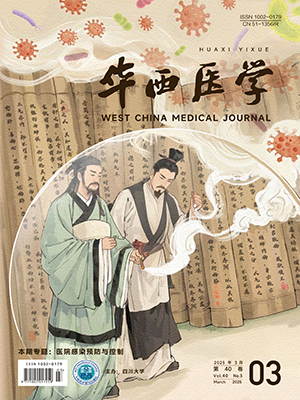| 1. |
李超, 张梦清, 窦祖林, 等. 中国特定人群吞咽功能障碍的流行病学调查报告. 中华物理医学与康复杂志, 2017, 39(12): 937-943.
|
| 2. |
胡佑红, 卫小梅, 窦祖林. 导管球囊扩张治疗环咽肌功能障碍的机制. 中华脑科疾病与康复杂志 (电子版), 2011, 1(1): 82-87.
|
| 3. |
万桂芳, 窦祖林, 兰月, 等. 球囊扩张术中球囊容积与吞咽功能恢复的相关性分析. 中华物理医学与康复杂志, 2009, 31(12): 820-822.
|
| 4. |
Kocdor P, Siegel ER, Tulunay-Ugur OE. Cricopharyngeal dysfunction: a systematic review comparing outcomesof dilatation, botulinum toxin injection, and myotomy. Laryngoscope, 2016, 126(1): 135-141.
|
| 5. |
Ashman A, Dale OT, Baldwin DL. Management of isolated cricopharyngeal dysfunction: systematic review. J Laryngol Otol, 2016, 130(7): 611-615.
|
| 6. |
朱榕, 张莉, 杨平, 等. 导尿管球囊扩张术对神经源性环咽肌失迟缓症治疗效果的 Meta 分析. 中国康复医学杂志, 2018, 33(5): 573-577.
|
| 7. |
兰月, 窦祖林, 万桂芳, 等. 球囊扩张术治疗脑干病变后环咽肌失弛缓症的疗效研究. 中华物理医学与康复杂志, 2009, 31(12): 835-838.
|
| 8. |
闫莹莹, 郭钢花, 郭君, 等. 不同频率高频重复经颅磁刺激治疗单侧脑卒中患者吞咽障碍的疗效观察. 中国康复, 2022, 37(8): 486-488.
|
| 9. |
Du J, Yang F, Liu L, et al. Repetitive transcrannial magnetic stimulation for rehabilatition of paststroke dysphagia: a randomized, double-blind clinical trial. Clin Neurophysiol, 2016, 127(3): 1907-1913.
|
| 10. |
中华医学会神经病学分会, 中华医学会神经病学分会脑血管病学组. 中国各类主要脑血管病诊断要点 2019. 中华神经科杂志, 2019, 52(9): 710-715.
|
| 11. |
赵瀛, 晏正梅, 陆巧妙, 等. 肉毒毒素注射联合球囊扩张治疗慢性脑卒中后环咽肌功能障碍的疗效研究. 中国实用医药, 2020, 15(36): 1-3.
|
| 12. |
中国医师协会神经调控专业委员会电休克与神经刺激学组. 重复经颅磁刺激治疗专家共识. 转化医学杂志, 2018, 7(1): 4-9.
|
| 13. |
Song W, Du B, Xu Q, et al. Low-frequency transcranial magnetic stimulation for visual spatial neglect: a pilot study. J Rehabil Med, 2009, 41(3): 162-165.
|
| 14. |
中国吞咽障碍康复评估与治疗专家共识组. 中国吞咽障碍评估与治疗专家共识(2017 年版)第一部分: 评估篇. 中华物理医学与康复杂志, 2017, 39(12): 881-892.
|
| 15. |
Costa MM. Videofluoroscopy: the gold standard exam for studying swallowing and its dysfunction. Arq Gastroenterol, 2010, 47(4): 327-328.
|
| 16. |
张百祥, 华何柳, 王秀玲, 等. 导尿管球囊扩张术在脑卒中后环咽肌失弛缓所致吞咽障碍患者中的应用研究. 中华物理医学与康复杂志, 2018, 40(7): 512-514.
|
| 17. |
戴萌, 窦祖林, 卫小梅, 等. 吞咽造影的分析及应用进展. 中国康复医学杂志, 2016, 31(11): 1269-1272.
|
| 18. |
Rosenbek JC, Robbins JA, Roecker EB, et al. A penetration-aspiration scale. Dysphagia, 1996, 11(2): 93-98.
|
| 19. |
Robbins J, Coyle J, Rosenbek J, et al. Differentiation of normal and abnormal airway protection during swallowing using the penetration-aspiration scale. Dysphagia, 1999, 14(4): 228-232.
|
| 20. |
Crary MA, Mann GD, Groher ME. Initial psychometric assessment of a functional oral intake scale for dysphagia in stroke patients. Arch Phys Med Rehabil, 2005, 86(8): 1516-1520.
|
| 21. |
Zhou H, Zhu Y, Zhang X. Validation of the Chinese version of the Functional Oral Intake Scale (FOIS) score in the assessment of acute stroke patients with dysphagia. Stud Health Technol Inform, 2017, 245: 1195-1199.
|
| 22. |
王修敏, 夏清. 环咽肌失弛缓症与环咽肌功能障碍辨析. 中华物理医学与康复杂志, 2016, 38(12): 958-960.
|
| 23. |
Arenaz Búa B, Olsson R, Westin U, et al. Treatment of cricopharyngeal dysfunction: a comparative pilot study. BMC Res Notes, 2015, 8: 301.
|
| 24. |
Allen JE. Cricopharyngeal function or dysfunction: what’s the deal?. Curr Opin Otolaryngol Head Neck Surg, 2016, 24(6): 494-499.
|
| 25. |
金琳娜, 廖志平, 邹朝君. 导管球囊扩张术治疗脑卒中患者环咽肌功能障碍的研究进展. 中华物理医学与康复杂志, 2018, 40(12): 957-960.
|
| 26. |
舒璇, 刘淑芬, 陈丽霞. 非侵入性脑刺激技术在神经系统疾病康复中的应用进展. 华西医学, 2021, 36(5): 566-571.
|
| 27. |
王曈, 董凌辉, 孟萍萍, 等. 重复经颅磁刺激治疗卒中后吞咽困难的相关临床研究进展. 中华物理医学与康复杂志, 2022, 44(10): 931-934.
|
| 28. |
Hamdy S, Aziz Q, Rothwell JC, et al. Recovery of swallowing after dysphagic stroke relates to functional reorganization in the intact motor cortex. Gastroenterology, 1998, 1l5(5): l104-1112.
|
| 29. |
Murase N, Duque J, Mazzocchio R, et al. Influence of interhemispheric interactions on motor function in chronic stroke. Ann Neurol, 2004, 55(3): 400-409.
|
| 30. |
柳华, 韩肖华, 黄晓琳. 重复经颅磁刺激调控皮质兴奋性的影响因素及机制. 中国康复医学杂志, 2017, 32(3): 354-358.
|
| 31. |
王京利, 张志强, 张立新, 等. 重复经颅磁刺激治疗卒中后吞咽障碍的研究进展. 中国康复医学杂志, 2019, 34(12): 1493-1496.
|
| 32. |
Roque C, Pinto N, Vaz Patto M, et al. Astrocytes contribute to the neuronal recovery promoted by high-frequency repetitive magnetic stimulation in in vitro models of ischemia. J Neurosci Res, 2021, 99(5): 1414-1432.
|
| 33. |
Baek A, Kim JH, Pyo S, et al. The differential effects of repetitive magnetic stimulation in an in vitro neuronal model of ischemia/reperfusion injury. Front Neurol, 2018, 9: 50.
|
| 34. |
Wen X, Liu Z, Zhong L, et al. The effectiveness of repetitive transcranial magnetic stimulation for post-stroke dysphagia: a systematic review and Meta-analysis. Front Hum Neurosci, 2022, 16: 841781.
|
| 35. |
Xie YL, Wang S, Jia JM, et al. Transcranial magnetic stimulation for improving dysphagia after stroke: a Meta-analysis of randomized controlled trials. Front Neurosci. 2022, 16: 854219.
|
| 36. |
Wagner T, Valero-Cabre A, Pascual-Leone A. Noninvasive human brain stimulation. Annu Rev Biomed Eng, 2007, 9: 527-565.
|
| 37. |
卫小梅, 窦祖林, 兰月, 等. 吞咽障碍干预的中枢神经通路调控机制. 中华物理医学与康复杂志, 2013, 35(12): 934-937.
|
| 38. |
Cheng IKY, Chan KMK, Wong CS, et al. Neuronavigated high-frequency repetitive transcranial magnetic stimulation for chronic post-stroke dysphagia: a randomized controlled study. J Rehabil Med, 2017, 49(6): 475-481.
|
| 39. |
李晓丽, 郭钢花, 李哲, 等. 重复经颅磁刺激对脑出血术后吞咽障碍伴颅骨缺损患者吞咽功能的影响. 中华物理医学与康复杂志, 2021, 43(3): 243-245.
|
| 40. |
Mistry S, Verin E, Singh S, et al. Unilateral suppression of pharyngeal motor cortex to repetitive transcranial magnetic stimulation reveals functional asymmetry in the hemispheric projections to human swallowing. J Physiol, 2007, 585(Pt2): 525-538.
|
| 41. |
Modugno N, Nakamura Y, Mackinnon CD, et al. Motor cortex excitability following short trains of repetitive magnetic stimuli. Exp Brain Res, 2001, 140(4): 453-459.
|
| 42. |
Khedr EM, Abo-Elfetoh N. Therapeutic role of rTMS on recovery of dysphagia in patients with lateral medullary syndrome and brainstem infarction. J Neurol Neurosurg Psychiatry, 2010, 81(5): 495-499.
|
| 43. |
Park E, Kim MS, Chang WH, et a1. Effects of bilateral repetitive transcranial magnetic stimulation on post-stroke dysphagia. Brain Stimul, 2017, 10(1): 75-82.
|
| 44. |
刘袁颖, 窦艳仙, 李哲贤, 等. 重复经颅磁刺激联合针刺治疗脑梗死后吞咽障碍对吞咽功能及皮质兴奋性的影响. 中国医学物理学杂志, 2022, 39(5): 623-626.
|
| 45. |
王伟, 刘亚群, 杨娜. 导管球囊扩张术联合重复经颅磁刺激治疗脑卒中后环咽肌失弛缓致吞咽功能障碍的临床观察. 中华物理医学与康复杂志, 2021, 43(8): 717-720.
|




